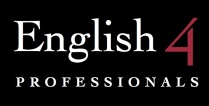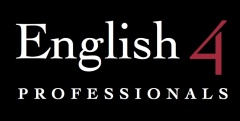 When students apply to English4Professionals, they are usually one of two types:
When students apply to English4Professionals, they are usually one of two types:
a) Those who are panicking about their IELTS test at the end of next week and want emergency help at short notice; &
b) Those who want to book a properly planned personal programme of learning.
The Desperadoes
Those who have left everything to the last moment are a thankless bunch to work with, and a group with whom we cannot win. If we take their money, they believe that we have some magical quality… and so they do not do any work! Then they fail and blame us…
Usually, these students will take the IELTS test 4, 5 or 6 times before they realise that they need to have a properly planned programme. The desperate dash simply does’t work.
Those who ask us for a properly planned programme of professional learning usually prepare well and pass. It is as simple as that.
Quality not Quantity
Or not quite. The first question posed by those planning an IELTS preparation course is “How many lessons do I need?”
Apparently, ‘it is generally accepted that approximately 200 hours of study are required to improve by one band-score’ in the IELTS test (1). Success however depends not on the quantity but on the quality of teaching you receive.
If you go to a small professional English language school – like E4P – you will get intensive, focussed teaching from professional teachers, working on your personal language needs. And you won’t need to pay for 200 hours to achieve your goal.
On the other hand, at one of the big language schools, you will be told to book 200 hours and this will probably include 10 weeks of classes (Monday to Friday), with 3 hours of teaching and 1 hour of homework per day. That sounds good, doesn’t it?
But, what does this actually mean? You will get:
– At least 12 in a class, so you get less than 1/12th of the teacher’s attention,
– Generalised lessons rather than a course tailored to your personal language needs; &
– A class full of students from your country who refuse to speak English to you!
In addition, just think how long it takes for 12 people to enter a classroom, settle down, organise themselves and get ready to learn. How long for the teacher to take a register, pass out the books and give comments on everybody’s homework? All this is before they start teaching and you start learning.
The amount of time spent meeting your learning needs in each hour is very small and, consequently, the results such classes achieve are pretty poor.
A False Economy
Many people prefer to travel Economy and save money. Why not? You get to your destination at the same time as First and Business class passengers, after all.
But learning English is not the same as airline travel. As a rule, if you pay for cheap courses in large classes, you will end up learning more Spanglish than English.
You may have spent less on this class, but it will take you longer and be less effective. In short, it is a false economy.
The 100 Hour Rule
E4P students are assessed when they enrol, so that we can tell you how we will meet your needs in the time available. (If you are a desperado, prepare to be disappointed.)
If you need to make that 1 grade band jump, it will take a maximum of 100 hours of hard work – in the classroom (75%) and as homework (25%). It takes less time because we are full-time, multiply-qualified, native-speaker professional English teachers… and we focus 100% of every lesson on you.
Whether you choose to do these classes over 5 weeks or 5 months, the cost is the same. And so will be the outcome. Just don’t ask us to produce magic for you in under 5 days!
(1) ‘Culture Shock of New Campus Life’; Guardian Weekly; 13-19th April 2000.








